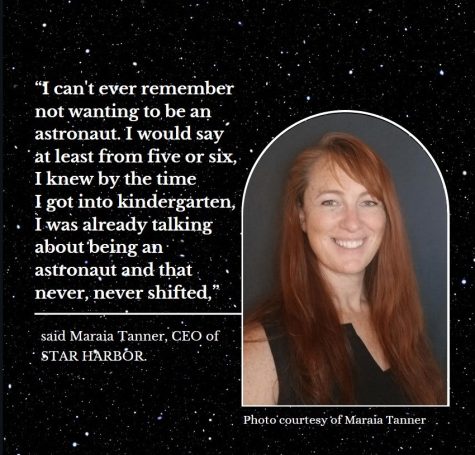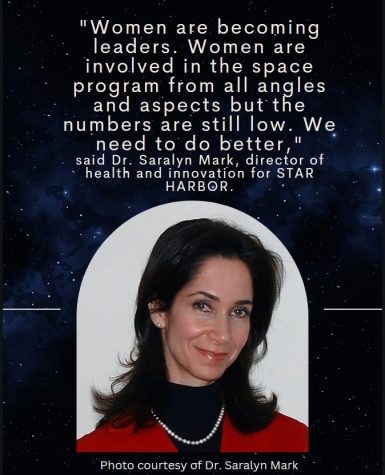
Astrophysicist makes astronomical difference for women in STEM
February 20, 2023
As an aspiring astronaut, one’s dream of going to the stars begins to take off through learning and training. For up and coming astronauts, some will meet others who had the same dream. For one such woman, she turned that dream into a company that would become the creator of the world’s first publicly accessible spaceflight training facility.
Maraia Tanner grew up with the aspiration of becoming an astronaut, but her path wasn’t linear getting there. She knew she always wanted to reach the stars even from when she was very young.
“I can’t ever remember not wanting to be an astronaut. I would say at least from 5 or 6, I knew by the time I got into kindergarten, I was already talking about being an astronaut and that never, never shifted,” Tanner said.

Tanner’s rise into the universe of aeronautics started with a different approach; taking on her plan B, which was not becoming an astronaut. The first two years of attending college, she went into political economy but then realized it wasn’t her passion.
“I had followed the well-intentioned advice of the adults around me who were like, ‘Becoming an astronaut, it’s really, really hard and only a few people get to do it. So what’s the backup plan?’ So I went to go do my backup plan and then was like, ‘No, this is terrible. I’m going back to space,’” Tanner said.
Tanner graduated as an aerospace engineer and started in the space industry right out of university. Tanner began her company STAR HARBOR to train future astronauts by teaching them actual spaceflight and preparation.
Tanner is the Chief Executive Officer (CEO) of the company which will further product research and the development of space analog environments in which they create environments at STAR HARBOR that would mimic an extraterrestrial environment such as on the Moon or Mars. The academy offers access to zero-gravity parabolic flight training, high gravity human centrifuge, hyperbaric and hypobaric chambers, and a 400+ million gallon buoyancy tank. The academy is projected to begin offering its services in 2026.
“I think we’ve lived in a very selective world where individuals who were superstars got to be astronauts, or if you were very wealthy, and so I really love the fact that Star Harbor really wants to open up space for everyone and not only open up the opportunities but ensure that they have the resources and the tools to be able to do their jobs well and safely,” said Dr. Saralyn Mark, director of health and innovation for STAR HARBOR.
Tanner’s woman-led team for the company includes Mark, who has been the senior medical adviser for the US Department of Health and Services and NASA, senior scientific policy adviser to the White House, and creator of her own boutique consultancy, SolaMed Solutions. Even from when she was young, Mark lived in ignorance of ever thinking she, as a woman, couldn’t ever become an astronaut.
“When I was a little girl, I wanted to be an astronaut. I actually wanted to be a doctor who practiced on the moon and fortunately, my parents didn’t tell me that women were really not allowed in the space program as astronauts,” Mark said.
Mark’s responsibilities with the company pertain to building a platform for new technologies, programs, and policies, as well as providing strategy analysis. She decided to take part in STAR HARBOR after she had met Maraia and saw that the company was going to take off.
“I was just really impressed by what her vision is and what she wants to do with her company. She just had a value system that I appreciated, and I think that’s really important…I also like the fact that it’s very much a team effort. She’s created a team approach within the company. It’s really not hierarchical or siloed,” Mark said.
A United Nations (UN) story highlights how the number of women in STEM careers is significantly lower than men in those same industries, which explains why women CEOs in science fields are still so rare.
“Recent research shows that women are still visibly underrepresented as researchers in STEM fields in all regions, averaging just 28.8 percent, globally,” states the UN.
The difficulties of going into a field that is dominated by men as a woman is not limited to Tanner, but also affect other women, including Mark.
“I think coming into NASA, which I’ve been with for 18 years, and then now in the commercial space sector, it can be challenging … It can be a sort of an ‘old boys club’ because that was traditionally what was in space-related careers,” Mark said.
For Tanner, the path to creating STAR HARBOR was made more difficult since she had the added challenge of having children. During the creation of a previous company, Tanner had her first child. Now with a baby, the inner engineer of Tanner couldn’t restrain her desire to do more than just stay at home, as she wasn’t that type of mom.
“Not that I didn’t love the time with my baby, but I was an engineer and a physicist, and I wanted to be creating something and doing something that challenged that side of me,” Tanner said.
The struggles of leading both roles of mom and CEO can overlap and become challenging given the many responsibilities of trying to balance both worlds.
“I was married and he was great about a lot of things, housework, generally not one of them. And so it was hard for a while when I was trying to build my own business and take care of all that stuff and take care of the babies,” Tanner said.
The maternal challenge
The responsibilities she had to take on at home and at work made it especially more complicated, but she had help. With her mom at home being able to help Tanner’s children, she was able to create STAR HARBOR.
“My mom was extraordinary after my second baby was born…I would say she was absolutely the reason why I was able to do what I’ve done in the early days of getting STAR HARBOR set up. She helped get the kids ready for school in the morning. We would trade off from some of these responsibilities,” Tanner said.
Mark explains the importance of this support system, especially for women, as it could be the difference between getting opportunities or leaving them behind.
“Women are living in what we call the ‘sandwich generation.’ They’re either taking care of parents or their children, or others around them and then you certainly have your work requirements. It’s been really difficult during the pandemic. A lot of women left the workforce because they just didn’t have the support that they needed,” Mark said.

The Proceedings of the National Academy of Sciences of the United States of America (PNAS) conducted a research study about the number of parents who change their commitment to the workforce after having children. The study found that the number of moms left for other types of jobs was notably higher than those of fathers.
“… By the second survey wave in 2006, after their first child, 15% of new fathers had left a full-time STEM job (85% stayed), and 42% of new mothers had left a full-time STEM job (only 58% stayed). By the final survey wave (2010), at 4–7 y(ears) after the birth or adoption of their first child, 23% of new fathers and 43% of new mothers had left full-time STEM employment for other types of work or had left the labor force entirely,” states PNAS.
Even with help from Tanner’s own support system which was allowing her to keep working to build her company, some were still skeptical of the work she was doing or not encouraging of the choices she was making as a mother.
“I remember talking to one of the moms from I think it was my daughter’s class and she was like, ‘Wow, that’s amazing. I would never be able to leave my children for that long.’ It’s a really backhanded comment because she sort of implied that she loved her kids more than I loved mine because I was willing to leave them, and it just really hit me,” Tanner said.
As Tanner explains, the bigger problem of moms in society is the expectations society puts on mothers to be near-perfect when fathers are not dealing with the same consequences for their paternal decisions.
“Like the travel I mentioned, one of the challenges is I don’t really see the dad counterparts dealing with so much…When they look at dads going on business trips, it’s just what is done, right? But for a lot of moms, I think there’s a lot of questions about like, are you doing the right thing? Are your kids gonna be okay? If you leave them for a week, are you like, somehow, destroying their childhood because you’re not there all the time,” Tanner said.
Mothers who decide to remain in their current positions after having children face the same kind of questions about whether they are still devoted and reliable workers, which is proven to be the case by the PNAS.
“Even mothers who remain in the professional workforce full time encounter stereotypes painting them as less competent than equally qualified men and childless women and face salary penalties and career barriers even while contributing the same dedicated work,” states the PNAS study.
SuDaerra Hoffman, Tanner’s daughter, had grown up to have a great image of her mother despite Tanner having to manage a company while raising Hoffman and her brother.
Just because she’s a CEO and a mom doesn’t mean she’s neglecting one of her other responsibilities. She’s a great mom to me and my brother and she’s a great friend to her friends, I’m sure. And she’s probably also a great parental figure to some of my friends and she’s also a great CEO. I mean, what she’s doing she wouldn’t be able to do without being a great businesswoman. — SuDaerra Hoffman
Though these concerns left Tanner questioning her parenting, her daughter, despite not liking the time away from her mother, was never upset at her for going on business trips. Tanner would always come back with interesting stories to share.
“She went somewhere in the UAE and brought back all these snacks and some really cool, culturally significant pieces that were really interesting and I got to learn about where they’re from and what she did there,” Hoffman said.
Despite having these unique experiences of having a mom who was contributing to the future of the space industry, Hoffman never noticed the difference between what her mom was doing and what other moms were doing until she was older.
“My mom gave me a brochure of her company and said, take this to class and show your classmates, see what they think of it. That’s when I realized, ‘Oh, no one else has done this because no one else’s parents are doing this’ and it was really cool. I got a bunch of comments and compliments from teachers,” Hoffman said.
Tanner was doing something that no other parents were and Hoffman’s admiration for her mother only grew. From being young and dreaming of becoming an astronaut, Tanner has created a way to expand the opportunity space has to offer for all. Hoffman has seen her mother create this company and the impact it has had on how future astronauts will be trained.
“I already thought she was really cool, but I thought she was even cooler after I realized that. It was also really fun to get to watch her do what she was doing, like meeting the people she was meeting. When I was probably 8 or 9 years old, I got to meet Leland Melvin. What 8-year-old gets to meet an astronaut as a friend of their mom?” Hoffman said.



